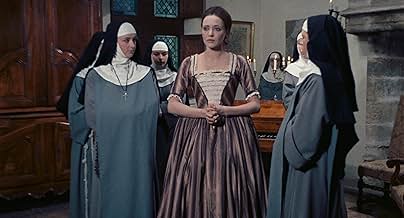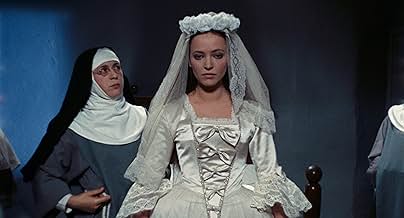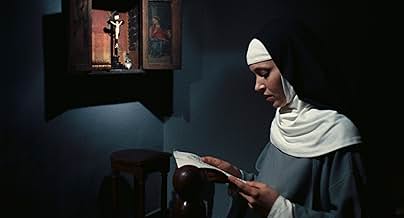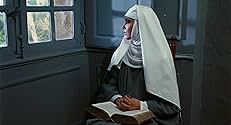IMDb RATING
7.5/10
3.5K
YOUR RATING
Suzanne is forced against her will to take vows as a nun and three mothers superior treat her in radically different ways. Suzanne's virtue brings disaster to everyone.Suzanne is forced against her will to take vows as a nun and three mothers superior treat her in radically different ways. Suzanne's virtue brings disaster to everyone.Suzanne is forced against her will to take vows as a nun and three mothers superior treat her in radically different ways. Suzanne's virtue brings disaster to everyone.
- Director
- Writers
- Stars
- Awards
- 2 nominations total
- Director
- Writers
- All cast & crew
- Production, box office & more at IMDbPro
7.53.4K
1
2
3
4
5
6
7
8
9
10
Featured reviews
Cinema Omnivore - The Nun (1966) 8.1/10
"The crux is, for Susanne, devout as she is, she feels that she has never received the calling from God. Her eventual vow-taking ceremony is conspicuously omitted on the screen, and reckoning by the reactions of her mother (Lénier) and Mother Superior Mme de Moni (Presle, ever so graceful and compassionate), something is certainly amiss there. Later Susanne claims that she has no recollection of the ceremony, perhaps she was in a fugue, witnessed by many, that fact could have been graciously taken as a testimony of revoking her vows had the church assumed a more liberal attitude towards its devotees. So one can see that it is religious orthodoxy, not Catholic church itself is the fair game here."
read my full review on my blog: cinema omnivore, thanks
read my full review on my blog: cinema omnivore, thanks
Deo Gratias
'La Religieuse' was published twelve years after the death of its author Denis Diderot, one of the greatest representatives of the Age of Enlightenment and the most unjustly reviled during his lifetime.
The novel, supposedly inspired by the death of his sister in a convent, was unsurprisingly disdained by Catholics. When it was presented on the stage by Jean-Luc Godard with his then wife Anna Karina in the title role it caused not a ripple but when it came to the film version however, there were calls for it to be banned. There is no such thing of course as bad publicity and when it was released in 1967 the attendant controversy proved to be very good box office!
This is not an easy watch to put it mildly. Director Jacques Rivette makes no concessions to the viewer. There are few close ups, no score to speak of and the tempo is lento throughout its 135 minute length.
What it does have is four strong female roles played by four exceptional actresses. Anna Karina reprises her stage role of Suzanne and one can tell that she has lived with the part and made it her own. It is a stunning performance. Micheline Presle, in one of the best of her later roles, is the Mother Superior who takes Suzanne under her wing but whose death leaves her to the not so tender mercies of Sister Sainte-Christine whose excess of pious zeal is frightening. Francine Bergé's impersonation of a nun in 'Judex' might have caused a few tingles in the male of the species but her performance here gives one the shivers.
Once Suzanne has been moved to another 'maison' she then falls prey to the Sapphic advances of the Mother Superior played by Liselotte Pulver. This is another splendid performance by the luminous Liselotte and will come as quite a surprise to English speaking viewers who remember her dancing in a polka dot dress on a table top to the strains of the 'Sabre Dance' in Wilder's 'One, Two, Three'!
Of the male contingent, Jean Martin and Francisco Rabal both impress.
This is a tale of Repression and is shot in an austere, Bresson-esque style which suits the material very well. The trailer proclaimed it to be a 'Hymn to Freedom' which would have gladdened Diderot who famously wrote: "No man will be free until the last king is strangled with the entrails of the last priest."
The novel, supposedly inspired by the death of his sister in a convent, was unsurprisingly disdained by Catholics. When it was presented on the stage by Jean-Luc Godard with his then wife Anna Karina in the title role it caused not a ripple but when it came to the film version however, there were calls for it to be banned. There is no such thing of course as bad publicity and when it was released in 1967 the attendant controversy proved to be very good box office!
This is not an easy watch to put it mildly. Director Jacques Rivette makes no concessions to the viewer. There are few close ups, no score to speak of and the tempo is lento throughout its 135 minute length.
What it does have is four strong female roles played by four exceptional actresses. Anna Karina reprises her stage role of Suzanne and one can tell that she has lived with the part and made it her own. It is a stunning performance. Micheline Presle, in one of the best of her later roles, is the Mother Superior who takes Suzanne under her wing but whose death leaves her to the not so tender mercies of Sister Sainte-Christine whose excess of pious zeal is frightening. Francine Bergé's impersonation of a nun in 'Judex' might have caused a few tingles in the male of the species but her performance here gives one the shivers.
Once Suzanne has been moved to another 'maison' she then falls prey to the Sapphic advances of the Mother Superior played by Liselotte Pulver. This is another splendid performance by the luminous Liselotte and will come as quite a surprise to English speaking viewers who remember her dancing in a polka dot dress on a table top to the strains of the 'Sabre Dance' in Wilder's 'One, Two, Three'!
Of the male contingent, Jean Martin and Francisco Rabal both impress.
This is a tale of Repression and is shot in an austere, Bresson-esque style which suits the material very well. The trailer proclaimed it to be a 'Hymn to Freedom' which would have gladdened Diderot who famously wrote: "No man will be free until the last king is strangled with the entrails of the last priest."
Exactly, kind of
This is exactly the kind of thing I would watch on Encore movie channel as a 13 year old in the 90s and think because it was a highly specific film hidden in the dark hour of 2 AM that it must be underground or convey secret things about life.
And I guess it does if these are secret, irrelevant, forgotten things, like the dream of a previous era that one can never know to be true or false.
But for sure, the films I saw like this I won't forget. They are like whole history lessons delivered in double--the time period of the story, and the culture period of the production.
The acting, and the beautiful set pieces and locations, and the nonmusical, drony bell music add to this impression of jarringly subtle value, meanwhile the story has that quality of classic French novels which I can somehow feel emanating from old Penguin paperbacks... the height of drama in an atmosphere of emptiness, the pathetic outnumbered by the purely unsympathetic, scene after scene; and all of it mired in seriousness and God.
Drink a few beers and go for it!
And I guess it does if these are secret, irrelevant, forgotten things, like the dream of a previous era that one can never know to be true or false.
But for sure, the films I saw like this I won't forget. They are like whole history lessons delivered in double--the time period of the story, and the culture period of the production.
The acting, and the beautiful set pieces and locations, and the nonmusical, drony bell music add to this impression of jarringly subtle value, meanwhile the story has that quality of classic French novels which I can somehow feel emanating from old Penguin paperbacks... the height of drama in an atmosphere of emptiness, the pathetic outnumbered by the purely unsympathetic, scene after scene; and all of it mired in seriousness and God.
Drink a few beers and go for it!
A Major Work of the French Cinema
During the 17th and 18th centuries it appears to have been quite common in Catholic countries for young women to be forced to enter convents against their will; this is, for example, the fate of one character in Manzoni's "The Betrothed", written in 1827 but set around 200 years earlier. "La Religieuse" by Denis Diderot is another work of literature which deals with the same problem. The main reason for this phenomenon was economic; although many convents required a "dowry" from prospective entrants, this was generally less than the amount of the dowry needed to attract a suitable husband, and once the girl had taken her vows the family no longer had any responsibility for her upkeep. In the case of Diderot's heroine Suzanne Simonin, however, there is another problem. She is the offspring of an extra-marital affair and her mother's husband is not her biological father. Suzanne's mother, therefore, resolves to shut her daughter up in a convent, partly because she believes that this will prevent her husband from discovering the truth, partly because the presence of the girl in the family home is a constant reminder of her adulterous affair, about which she now has a guilty conscience.
The film follows the unhappy Suzanne's life as a nun. It falls into three sections, corresponding to the three Mothers Superior under whom she serves. The first, Madame de Moni, is a kindly woman who knows that Suzanne has only entered into the religious life with great reluctance and does her best to make the girl's life bearable. When de Moni dies, however, the new Mother Superior, the fanatical and puritanical Sister Sainte-Christine takes a dislike to Suzanne, whom she sees as rebellious, treating her harshly, whipping her, putting her on a diet of bread and water, and forbidding the other nuns to have anything to do with her. (Sainte-Christine is also referred to by her family name, Madame de Tourmont, a name probably chosen because of its similarity to "tourment", French for "torment").
With the assistance of a sympathetic lawyer, Suzanne asks to be released from her vows, on the grounds that she was forced to become a nun against her will. This application is unsuccessful, but at least she is transferred to another convent. Sainte-Christine is reprimanded by the Bishop for her treatment of Suzanne, but is not otherwise punished. This change in Suzanne's fortunes, however, is not necessarily for the better. Whereas Sainte-Christine's regime was characterised by an excess of religious zeal, life in the new convent is marked by an almost total lack of it. The nuns pay only the bare minimum of attention to their religious observances, spending most of their time in gossiping, eating and drinking and frivolous entertainments. Suzanne is befriended by the Mother Superior Madame de Chelles, who despite her elevated rank is a gay (in the original sense), light-hearted young woman, not much older than Suzanne herself. What the naive Suzanne fails to realise is that her new friend is also gay in the modern sense of the word and is offering her rather more than platonic friendship.
There are some excellent performances, from Anna Karina as the naïve but spirited Suzanne, Liselotte Pulver as the hypocritical de Chelles, Francine Bergé as Sainte-Christine and Francisco Rabal as Dom Morel, a priest who offers to help Suzanne but might also have self-serving motives. For a French movie this one is surprisingly international- Karina was Danish, Pulver Swiss and Rabal Spanish. Another important role is played by the German Wolfgang Reichmann.
When this film was made in 1966 it was promptly banned by the French authorities. It might have been the swinging sixties in the Anglo-Saxon world, but De Gaulle's France was a surprisingly conservative place. The authorities objected to what they saw as a disrespectful attitude to the Catholic Church, even though the action takes place 200 years in the past and the events depicted are fictitious ones. The film, however, is not particularly erotic; in Diderot's novel Suzanne and de Chelles actually end up in bed together- the younger girl is too innocent to realise what is happening to her- but this scene is omitted from the film.
The decision to omit this scene was, I think, the correct one, as "La Religieuse" was not made as a soft-porn fantasy but as a serious examination of three different types of religious hypocrisy, that of de Chelles, that of Suzanne's parents and that of Sainte-Christine, whose treatment of Suzanne owes more to an innate sadism than it does to genuine religious fervour. The serious nature of the film is emphasised by the austere look which director Jacques Rivette brings to it. Most of the action takes place in enclosed rooms, giving it a claustrophobic feel, and the predominant colour is the grey of the convent walls and of the nuns' habits. The moral climate in France gradually became more liberal, the ban was soon lifted and today "La Religieuse" can be seen as a major work of the French cinema. 8/10
The film follows the unhappy Suzanne's life as a nun. It falls into three sections, corresponding to the three Mothers Superior under whom she serves. The first, Madame de Moni, is a kindly woman who knows that Suzanne has only entered into the religious life with great reluctance and does her best to make the girl's life bearable. When de Moni dies, however, the new Mother Superior, the fanatical and puritanical Sister Sainte-Christine takes a dislike to Suzanne, whom she sees as rebellious, treating her harshly, whipping her, putting her on a diet of bread and water, and forbidding the other nuns to have anything to do with her. (Sainte-Christine is also referred to by her family name, Madame de Tourmont, a name probably chosen because of its similarity to "tourment", French for "torment").
With the assistance of a sympathetic lawyer, Suzanne asks to be released from her vows, on the grounds that she was forced to become a nun against her will. This application is unsuccessful, but at least she is transferred to another convent. Sainte-Christine is reprimanded by the Bishop for her treatment of Suzanne, but is not otherwise punished. This change in Suzanne's fortunes, however, is not necessarily for the better. Whereas Sainte-Christine's regime was characterised by an excess of religious zeal, life in the new convent is marked by an almost total lack of it. The nuns pay only the bare minimum of attention to their religious observances, spending most of their time in gossiping, eating and drinking and frivolous entertainments. Suzanne is befriended by the Mother Superior Madame de Chelles, who despite her elevated rank is a gay (in the original sense), light-hearted young woman, not much older than Suzanne herself. What the naive Suzanne fails to realise is that her new friend is also gay in the modern sense of the word and is offering her rather more than platonic friendship.
There are some excellent performances, from Anna Karina as the naïve but spirited Suzanne, Liselotte Pulver as the hypocritical de Chelles, Francine Bergé as Sainte-Christine and Francisco Rabal as Dom Morel, a priest who offers to help Suzanne but might also have self-serving motives. For a French movie this one is surprisingly international- Karina was Danish, Pulver Swiss and Rabal Spanish. Another important role is played by the German Wolfgang Reichmann.
When this film was made in 1966 it was promptly banned by the French authorities. It might have been the swinging sixties in the Anglo-Saxon world, but De Gaulle's France was a surprisingly conservative place. The authorities objected to what they saw as a disrespectful attitude to the Catholic Church, even though the action takes place 200 years in the past and the events depicted are fictitious ones. The film, however, is not particularly erotic; in Diderot's novel Suzanne and de Chelles actually end up in bed together- the younger girl is too innocent to realise what is happening to her- but this scene is omitted from the film.
The decision to omit this scene was, I think, the correct one, as "La Religieuse" was not made as a soft-porn fantasy but as a serious examination of three different types of religious hypocrisy, that of de Chelles, that of Suzanne's parents and that of Sainte-Christine, whose treatment of Suzanne owes more to an innate sadism than it does to genuine religious fervour. The serious nature of the film is emphasised by the austere look which director Jacques Rivette brings to it. Most of the action takes place in enclosed rooms, giving it a claustrophobic feel, and the predominant colour is the grey of the convent walls and of the nuns' habits. The moral climate in France gradually became more liberal, the ban was soon lifted and today "La Religieuse" can be seen as a major work of the French cinema. 8/10
Jansenist
Although Jacques Rivette was labeled "new wave","la religieuse" is actually an austere work,a bit academic,very close to the pre-new wave generation,very close to Jean Delannoy.By far ,one of the two most palatable works by highbrow Rivette (the other one being the umpteenth version of Joan of Arc,thanks to Sandrine Bonnaire's portrayal).Needless to say ,all other Rivette works are "intellectual" works ,reserved for the happy(?) few ,and they will make yawn your head off.
"La religieuse" caused a big scandal when it was released in the mid-sixties.The Church insisted on calling the movie "Suzanne Simonin ,la religieuse de Diderot".
Released with a PG 18, the movie seems harmless today:yes there's a lesbian nun ,but the crowds have seen worse since.It's a jansenist work,with a very slow pace,faithful to Diderot's novel-which anyway depicted an improbable situation:they did not lock the girls in nunneries anymore ,it was a thing of the past in the XVIII th century-,except for the ending ,but Rivette's one makes sense all in all.
The cinematography is beautiful and anti-nouvelle vague,the actresses convincing:Micheline Presles,a saint of a nun,Anna Karina, her cruel mother's unfortunate victim,and Liselotte Pulver,a bon vivant character who's got a crush on Suzanne .
"La religieuse" caused a big scandal when it was released in the mid-sixties.The Church insisted on calling the movie "Suzanne Simonin ,la religieuse de Diderot".
Released with a PG 18, the movie seems harmless today:yes there's a lesbian nun ,but the crowds have seen worse since.It's a jansenist work,with a very slow pace,faithful to Diderot's novel-which anyway depicted an improbable situation:they did not lock the girls in nunneries anymore ,it was a thing of the past in the XVIII th century-,except for the ending ,but Rivette's one makes sense all in all.
The cinematography is beautiful and anti-nouvelle vague,the actresses convincing:Micheline Presles,a saint of a nun,Anna Karina, her cruel mother's unfortunate victim,and Liselotte Pulver,a bon vivant character who's got a crush on Suzanne .
Did you know
- TriviaDespite being approved by the Censorship Board the film's theatrical release was initial blocked by the Minister of Information.
- GoofsSuzanne plays and sings the song "Plaisir D'Amour". The final title card identifies the time and place as 'Paris, 1760', but the song was not composed until 1785.
- Quotes
Monsieur Hébert: Your superior will shortly be told in the name of Sister Marie-Suzanne Simonin of a protest against her vows with a request to leave religious life and leave the cloister to live her life as she sees fit.
- ConnectionsFeatured in Deux de la Vague (2010)
- How long is The Nun?Powered by Alexa
Details
- Release date
- Country of origin
- Official sites
- Languages
- Also known as
- Redovnica
- Filming locations
- Production companies
- See more company credits at IMDbPro
Box office
- Gross US & Canada
- $30,245
- Opening weekend US & Canada
- $6,273
- Jan 6, 2019
- Gross worldwide
- $32,659
Contribute to this page
Suggest an edit or add missing content

![Watch Bande-annonce [OV]](https://m.media-amazon.com/images/M/MV5BZjIxOTRkY2ItNjJkOS00ZWMwLWFkM2UtY2FmYzU4NTIyNWQ2XkEyXkFqcGdeQXRodW1ibmFpbC1pbml0aWFsaXplcg@@._V1_QL75_UX500_CR0)































